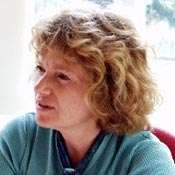Donna Dickenson
| Donna Dickenson | |
|---|---|
 | |
| Born |
1946 New England |
| Residence | Oxfordshire, England |
| Nationality | American |
| Education | B.A., M.Sc., Ph.D. |
| Alma mater | Wellesley College, London School of Economics |
| Occupation | Philosopher |
| Spouse(s) | Christopher Britton |
| Children | Son and daughter, Anders and Pip Lustgarten[1] |
| Awards | International Spinoza Lens prize, 2006. |
| Website | Donna Dickenson |
Donna L. Dickenson (born 1946) is an American philosopher who specializes in medical ethics. She is Emeritus Professor of Medical Ethics and Humanities at the University of London, fellow of the Ethox and HeLEX Centres at the University of Oxford, and visiting fellow at the Centre for Ethics in Medicine, University of Bristol.[2]
She has written over 20 books on the subject, including Bioethics: All That Matters (a short introduction) (2012); Me Medicine vs. We Medicine: Reclaiming Biotechnology for the Common Good (2013), Moral Luck in Medical Ethics and Practical Politics (1991), Risk and Luck in Medical Ethics (2003), Property in the Body: Feminist Perspectives (2007), and Body Shopping: Converting Body Parts to Profit (2009). She is also the co-author of The Cambridge Medical Ethics Workbook (2001), and second edition of The Cambridge Medical Ethics Workbook (2010).[3]
Education
Dickenson is an alumna of Choate Rosemary Hall in Connecticut and Wellesley College in Massachusetts, where her B.A. was in political science. She obtained an M.Sc. in international relations from the London School of Economics.[4] She returned to the U.S. to work as a research assistant at Yale University, and spent a year working for the Vera Institute of Justice in New York City. In 1974, she took up a post at the Open University in the UK, and later obtained her doctorate in philosophy with a study on moral luck in ethics and politics.[3] She worked as a lecturer at the Open University for 22 years; during that time she developed a nationwide course on death and dying, funded by the Department of Health to disseminate new advances in palliative care and ethical issues to a wider public.[4]
Career
In 1997, she moved to Imperial College, London as Leverhulme Reader in Medical Ethics and Law, and in 2001 to the University of Birmingham as John Ferguson Professor of Global Ethics. In 2005, she became Professor of Medical Ethics and Humanities at Birkbeck College, London, where she directed the Birkbeck Institute for the Humanities. She also directed four international research projects for the European Commission, including the Network for European Women's Rights (2004-2006), funded by the Vth Framework Programme of European Commission to investigate contrasting European approaches to ethical and legal issues in reproductive ethics, trafficking, women’s political participation and social entitlements (Heather Widdows et al. (eds), Women's Reproductive Rights [Basingstoke: Palgrave Macmillan, 2006]).
She has given expert evidence to bodies including the House of Commons Science and Technology Committee and the European Association of National Bioethics Committees, and has served on many national ethics governance bodies, such as the Ethics Committee of the UK Royal College of Obstetricians and Gynaecologists (2003- 2009).
In 2006, she became the first woman to receive the International Spinoza Lens prize, a bi-annual prize in ethics awarded in the Netherlands.[5]
See also
Notes
- ↑ Dickenson, Donna (2009). Body Shopping, p. xiv.
- ↑ Donna Dickenson, Helex, accessed January 24, 2010.
- 1 2 Academic, Donnadickenson.net, accessed January 24, 2010.
- 1 2 Donna Dickenson, Spinozalens, accessed January 25, 1010.
- ↑ Donna Dickenson is the first woman to receive prestigious Spinoza Lens award ..., Birkbeck College, London, accessed January 24, 2010.
External links
|